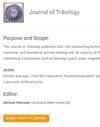Experimental tribological study on additive manufactured Inconel 718 features against the hard carbide counter bodies
IF 3
3区 工程技术
Q2 ENGINEERING, MECHANICAL
引用次数: 0
Abstract
In past years, machining processes have been required when fabricating the complex Inconel 718 parts, and these processes cause undesired tensile residual stresses. Inconel 718 also exhibits extreme work hardening throughout the machining process. To avoid these issues, recently, Inconel 718 parts with high geometric complexity and dimensional accuracy, the laser powder bed fusion (LPBF) process, which belongs to additive manufacturing, has been extensively used. These Inconel 718 parts with LPBF processing are frequently utilized in various industries, including aerospace, automotive, pharmaceutical, and food processing, because of their high strength, biocompatibility, and corrosion resistance. Wear resistance is essential in addition to these properties for designing and crushing applications. In this paper, tribological tests were conducted on the LBPF-processed Inconel 718 parts and compared to casted Inconel 718 parts against the four types of counter bodies, namely boron carbide, silicon carbide, tungsten carbide, and titanium carbide. The studies were carried out for 30 min with a constant load of 5 N, frequency of 10 Hz, and stroke length of 1 mm. In comparison to casted samples, LBPF-processed samples showed low COF values. The highest COF was observed on the cast Inconel 718 against the tungsten carbide counter body. The wear mechanisms were studied using SEM.增材制造Inconel 718与硬质合金对抗体摩擦学特性的实验研究
在过去的几年中,在制造复杂的Inconel 718零件时需要机械加工工艺,而这些工艺会产生不希望的拉伸残余应力。Inconel 718在整个加工过程中也表现出极端的加工硬化。为了避免这些问题,近年来,对于几何复杂度高、尺寸精度高的Inconel 718零件,属于增材制造的激光粉末床熔合(LPBF)工艺得到了广泛的应用。由于其高强度、生物相容性和耐腐蚀性,这些采用LPBF加工的Inconel 718部件经常用于各种行业,包括航空航天、汽车、制药和食品加工。除了这些性能外,耐磨性对于设计和粉碎应用也是必不可少的。本文对lbpf加工的Inconel 718零件进行了摩擦学试验,并与铸造的Inconel 718零件进行了碳化硼、碳化硅、碳化钨和碳化钛四种基体的对比。研究进行30分钟,恒定负荷为5 N,频率为10 Hz,行程长度为1 mm。与铸造样品相比,lbpf处理样品的COF值较低。在铸铬镍铁合金718与碳化钨对抗体上观察到最高的COF。利用扫描电镜对磨损机理进行了研究。
本文章由计算机程序翻译,如有差异,请以英文原文为准。
求助全文
约1分钟内获得全文
求助全文
来源期刊
CiteScore
4.20
自引率
12.00%
发文量
117
审稿时长
4.1 months
期刊介绍:
The Journal of Tribology publishes over 100 outstanding technical articles of permanent interest to the tribology community annually and attracts articles by tribologists from around the world. The journal features a mix of experimental, numerical, and theoretical articles dealing with all aspects of the field. In addition to being of interest to engineers and other scientists doing research in the field, the Journal is also of great importance to engineers who design or use mechanical components such as bearings, gears, seals, magnetic recording heads and disks, or prosthetic joints, or who are involved with manufacturing processes.
Scope: Friction and wear; Fluid film lubrication; Elastohydrodynamic lubrication; Surface properties and characterization; Contact mechanics; Magnetic recordings; Tribological systems; Seals; Bearing design and technology; Gears; Metalworking; Lubricants; Artificial joints

 求助内容:
求助内容: 应助结果提醒方式:
应助结果提醒方式:


